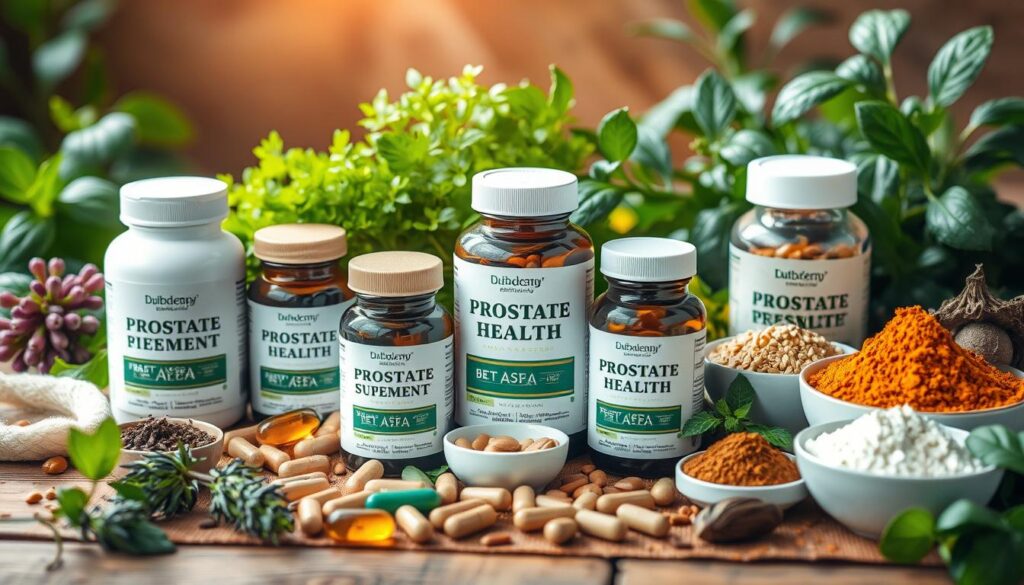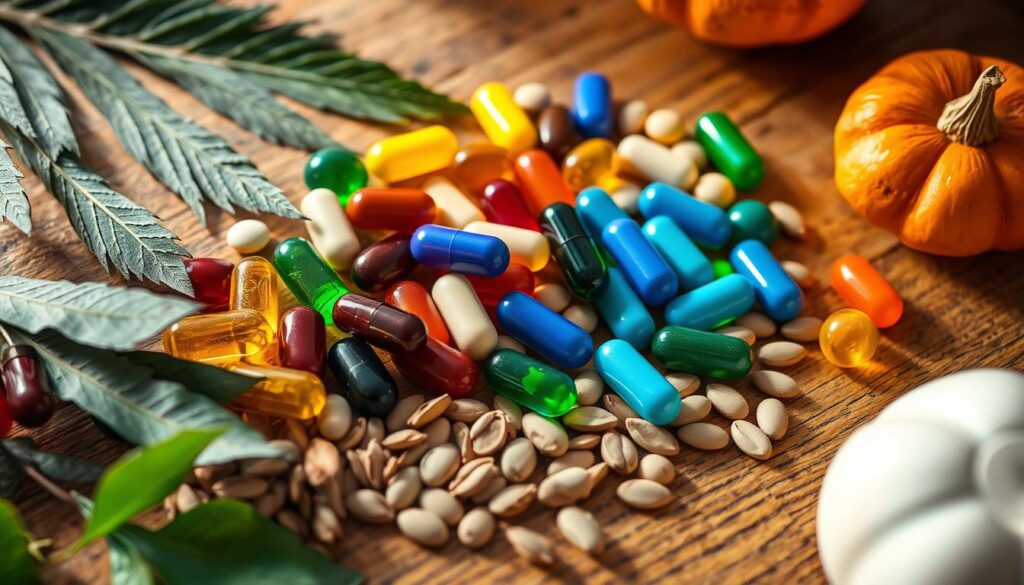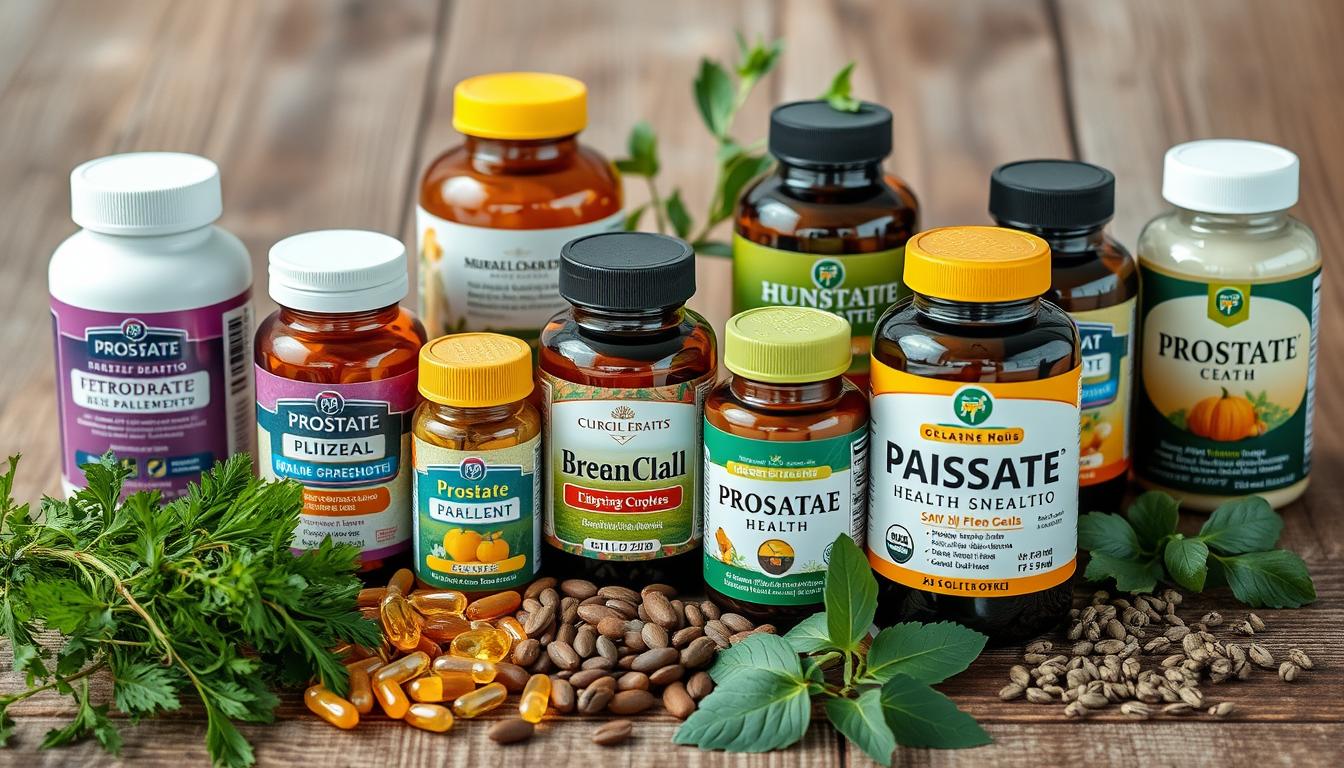Prostate Health Supplements: Support Male Wellness
As I near my 50s, I’m more worried about my prostate health. It’s a topic many men avoid, but it’s key for our health. I’ve found that supplements can help a lot, and I want to share what I’ve learned.
The prostate is a small gland but very important for men’s health. As we get older, it can grow too big or even get cancer. Knowing that prostate cancer is a big risk for men in the U.S. makes me want to take care of it early1.
Prostate cancer is rare before 40, but enlarged prostate is common after 402. This is a big worry for many of us. So, I’ve started using supplements to help my prostate.
These supplements have ingredients like saw palmetto and beta-sitosterol. They might help our prostate. But, it’s also important to change our lifestyle. Just 30 minutes of exercise can lower our risk of prostate problems by 10% to 30%2. It’s good to know we can help our health.
We’ll explore more about prostate support and supplements. We’ll look at common issues and the best supplements. It’s important to understand this part of men’s health together.
Key Takeaways
- Prostate health is crucial for male wellness, especially after 40
- Prostate cancer is a significant concern for men in the United States
- Prostate health supplements can support prostate function
- Exercise plays a vital role in reducing prostate health risks
- A holistic approach combining supplements and lifestyle changes is most effective
Understanding the Prostate and Common Health Issues
The prostate is key to male reproductive health. As men get older, they face many prostate-related problems. These issues can affect their quality of life. Let’s look at the prostate’s role and common problems it faces.
What is the prostate and its function?
The prostate is a small gland under the bladder. It makes a fluid that helps sperm, which is part of semen. By 40, it might grow a bit, and by 60, it can be as big as a lemon3.
Learn More About A Powerful Urinary Flow Without Thinking Twice About Your Prostate.
Prostate cancer and enlarged prostate: Key concerns
Prostate cancer is the top cancer in men globally4. It often doesn’t show symptoms early, so regular check-ups are vital3. An enlarged prostate, or BPH, is another big issue. Symptoms like needing to pee a lot, especially at night, are common reasons for doctor visits3.
Risk factors for prostate-related conditions
Age is a big risk factor for prostate problems. Men over 50 often face prostate issues as their gland grows4. Other risks include:
- Family history: Having a relative with prostate cancer raises your risk3.
- Ethnicity: African American men get prostate cancer more often3.
- Lifestyle: Diet and being overweight can affect prostate health.
Knowing these risks can help men stay proactive about their prostate health. While supplements can help, it’s crucial to talk to a doctor. They can diagnose and treat prostate cancer symptoms or discuss ways to manage an enlarged prostate.
The Role of Prostate Health Supplements

Prostate health supplements are popular among men looking to support their prostate. These products often include ingredients aimed at improving male health.
Common ingredients in prostate supplements
Saw palmetto and beta-sitosterol are common in prostate health supplements. They are thought to help with enlarged prostate symptoms. Vitamin E and selenium are also found in these supplements.
| Ingredient | Claimed Benefits | Research Findings |
|---|---|---|
| Saw Palmetto | May reduce prostate enlargement | Mixed results, some positive findings on limiting gland enlargement5 |
| Beta-Sitosterol | Can improve urinary symptoms | Limited studies, more research needed |
| Vitamin E | Antioxidant properties | May increase prostate cancer risk by 17% at 400 IU daily5 |
| Selenium | Supports prostate health | Inconclusive results, potential mortality risk increase5 |
Effectiveness of supplements for prostate health
The effectiveness of prostate supplements varies. Saw palmetto has shown mixed results in improving urine flow and reducing prostate size5. Zinc’s impact on prostate health is still uncertain, with studies showing conflicting results5.
Safety considerations and potential side effects
Safety is key when considering prostate supplements. The FDA doesn’t regulate these products as strictly as prescription drugs. This can lead to variability in content and potency5. Taking too much of certain compounds in supplements can cause serious health problems5.
Green tea supplements are generally safe for short-term use but can cause more side effects than placebos in long-term trials6.
It’s worrying that less than half of men with prostate cancer talk to their doctors about supplements56. This highlights the need to consult a doctor before starting any supplement regimen. Some men may delay seeking specialist care by trying multiple supplements that may not work7.
Learn More About A Powerful Urinary Flow Without Thinking Twice About Your Prostate.
Popular Prostate Health Supplements and Their Benefits

I’ve looked into many prostate health tablets and found some great options. Saw palmetto is a top pick. It might help with symptoms of benign prostatic hyperplasia (BPH) and reduce inflammation8.
Pygeum bark supplements come from the African plum tree. They could help with nighttime urination, improve urine flow, and empty the bladder better in men with BPH9.
Quercetin supplements are also getting attention for prostate health. More research is needed, but quercetin might help with BPH symptoms. It’s often mixed with other ingredients for better results9.
Pumpkin seeds and their oil might help with BPH symptoms. They could also help shrink the prostate9.
Stinging nettle root is another supplement to think about. It might help with urine flow and nighttime urination in BPH cases. A study showed that 450 mg of Urtica dioica root extract daily for 12 weeks improved BPH symptoms89.
When picking prostate health supplements, look at the price. They can cost between $0.21 and $1.09 per serving, or $18.65 to $79.80 per container8. Always talk to a healthcare professional before starting any new supplement.
Lifestyle Factors That Complement Prostate Health Supplements

Prostate health is more than just supplements. Let’s look at lifestyle changes that can help a lot.
Diet and Nutrition for Prostate Wellness
Eating well is key for your prostate. Focus on foods like tomatoes and watermelon, which are full of lycopene. They might lower your risk of prostate cancer10. Also, choose lean proteins and eat less fat.
Research shows that eating healthy, like lots of fish and veggies, can lead to using supplements10. This shows how important being aware of your diet is for your health.
Learn More About A Powerful Urinary Flow Without Thinking Twice About Your Prostate.
| Prostate-Friendly Foods | Benefits |
|---|---|
| Tomatoes | Rich in lycopene, may reduce prostate cancer risk |
| Fatty Fish | High in omega-3s, supports overall prostate health |
| Green Tea | Contains antioxidants that may slow prostate cancer growth |
| Broccoli | High in sulforaphane, may target and kill prostate cancer cells |
Exercise and Its Impact on Prostate Health
Exercise is a big help for your prostate. Just 30 minutes a day can lower your risk of prostate problems11. It’s a simple way to boost your health.
Stress Reduction Techniques for Overall Male Wellness
Too much stress can harm your prostate. Try stress-reducing activities like meditation or yoga. They can help keep your prostate healthy.
Studies show that men with prostate cancer often use mind-body therapies10. This shows how important it is to manage stress for prostate health.
“Taking care of your prostate is about more than just supplements. It’s about embracing a healthy lifestyle that nourishes your body and mind.”
Don’t forget to drink plenty of water and caffeine-free teas like green tea. They help your prostate work better and keep you healthy.
Conclusion
I’ve looked into prostate health supplements and their importance for men’s health. These products help support the prostate and tackle issues like benign prostatic hyperplasia (BPH). BPH affects 60% of men by age 60 and up to 90% by age 7012.
Prostate cancer is also a big worry, being the second most common cancer in men after skin cancer1213.
Many prostate health supplements are out there, but not all work the same. A study of 27 products found 58 active ingredients. Sadly, only 17 had ingredients backed by research12. Saw palmetto, for example, might help with BPH symptoms when used with beta-sitosterol12.
But, some supplements like selenium and vitamin E don’t have proven benefits and might even be harmful1213.
But, it’s not just about supplements. A healthy diet, regular exercise, and managing stress are also key for prostate health13. Prescription treatments like finasteride can reduce prostate cancer risk by 20-25%, but they come with risks too13.
In my opinion, a balanced approach to prostate health is essential. This means a healthy lifestyle, regular check-ups, and choosing supplements wisely with a doctor’s advice. While supplements can help, they’re not a cure-all. Every man’s journey to better prostate health is different, needing tailored care and informed choices.
Learn More About A Powerful Urinary Flow Without Thinking Twice About Your Prostate.
FAQ
What is the prostate and its function?
What are the common prostate health issues?
What are the risk factors for prostate-related conditions?
What are some common ingredients in prostate health supplements?
Are prostate health supplements effective?
Are there any safety concerns with prostate health supplements?
What are some popular prostate health supplements and their benefits?
What dietary and lifestyle factors can complement prostate health supplements?
Source Links
- Top 10 Prostate Health Supplements – https://www.verywellhealth.com/prostate-health-supplements-8417119
- What to Know About Supplements and Prostate Health – https://www.webmd.com/men/what-to-know-about-supplements-and-prostate-health
- Understanding Prostate Changes – https://www.cancer.gov/types/prostate/understanding-prostate-changes
- Prostate Health and Supplements: Know the Facts – https://www.healthline.com/nutrition/prostate-health-and-supplements
- Will Taking Supplements Improve Your Prostate Health? – https://health.clevelandclinic.org/will-taking-supplements-improve-my-prostate-health
- Prostate Cancer, Nutrition, and Dietary Supplements – https://www.cancer.gov/about-cancer/treatment/cam/patient/prostate-supplements-pdq
- Do supplements for prostate health work? – https://healthymale.org.au/health-article/do-prostate-health-supplements-work
- The 7 Best Prostate Health Supplements – https://www.healthline.com/nutrition/best-prostate-supplements
- Do Supplements Help with BPH? – https://www.webmd.com/men/prostate-enlargement-bph/enlarged-prostate-supplements-remedies
- Prostate Cancer, Nutrition, and Dietary Supplements (PDQ®) – https://www.cancer.gov/about-cancer/treatment/cam/hp/prostate-supplements-pdq
- Dietary Factors and Supplements Influencing Prostate-Specific Antigen (PSA) Concentrations in Men with Prostate Cancer and Increased Cancer Risk: An Evidence Analysis Review Based on Randomized Controlled Trials – https://www.ncbi.nlm.nih.gov/pmc/articles/PMC7600271/
- The Truth About Prostate Health Supplements | Bottom Line Inc – https://www.bottomlineinc.com/health/prostate/the-truth-about-prostate-health-supplements
- The Truth About Prostate Cancer Supplements – Orlando Health – One of Central Florida’s Most Comprehensive Healthcare Networks – https://www.orlandohealth.com/content-hub/the-truth-about-prostate-cancer-supplements/

